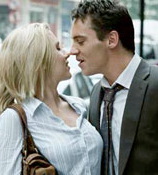 Woody Allen’s newest film, Match Point, starring Scarlett Johansson as Nola Rice, and Jonathan Rhys-Meyers as Chris Wilton, is a far cry from the typical screwball comedy for which he is famous. Opening nationwide today, this well-acted (for the most part) drama will surely lure audiences well beyond Woody Allen’s usual fan base, but don’t expect a single laugh from the experience. Matchpoint is intense drama through and through.
Woody Allen’s newest film, Match Point, starring Scarlett Johansson as Nola Rice, and Jonathan Rhys-Meyers as Chris Wilton, is a far cry from the typical screwball comedy for which he is famous. Opening nationwide today, this well-acted (for the most part) drama will surely lure audiences well beyond Woody Allen’s usual fan base, but don’t expect a single laugh from the experience. Matchpoint is intense drama through and through.
The story revolves around the life of Chris Wilton, a former tennis star trying to make a living in London who lands a job at a prestigious country club as a tennis pro. Despite humble origins, his well-mannered demeanor and good looks win him friends in the highest of places–most of all, with the Hewett family, who will offer him, among other things: a wife, a prestigious job, a home, a driver, all the money he could ever want, a best friend, and most of all, a family that loves him dearly. Chris rises from rags to riches within minutes of the opening credits.
Despite Chris’s good fortune, or luck as he might put it, as far as social connections go–and the unconditional riches lavished upon him, both literally and figuratively–he remains emotionally set apart from everyone around him, not quite happy, and this listlessness becomes the driving force of the film: his affair with Nola Rice, the American transplant, struggling actress, and former fiance of his brother-in-law, Tom Hewett. He decides to risk everything for the one thing that is missing in his life with the Hewitts: passion.
The central theme of this film, that life is not so much about the choices we make, how hard we work, the values we uphold, or the commitments we fulfill, but instead is really about how lucky we are is revealed from the very beginning in the opening narration. This idea is illustrated by a tennis ball striking the net in such a way and bouncing straight up in such a way that it is impossible to know on which side of the net it will land, and therefore, which player will end up the winner. The theme of luck–that ultimately, outcomes, consequences, and responsibility is not really about doing right, being faithful, and living honestly–is kept aloft throughout the film and grows more shocking and disturbing as the web Chris weaves between himself and Nola on one end, and the Hewitts on the other, grows ever more complicated.
Viewers will surely be left asking hefty questions about morality, fidelity, and whether the lives we live have any purpose or meaning at all, or whether the difference between jail and freedom, despair and happiness, keeping everything or losing it all, is rather more like the tennis ball that strikes the net just so, randomly falling on one side or the other.
Matchpoint is a feast for the existentialist. (I couldn’t stop thinking of Milan Kundera’s “The Unbearable Lightness of Being” throughout, though Wilton’s character seems to prefer Dostoevsky.) But this film will more likely leave the traditional moralist starving and even angry at the outcomes. Regardless of which audience you are, it’s Woody Allen’s best effort in years and well worth the trip to the theater.


